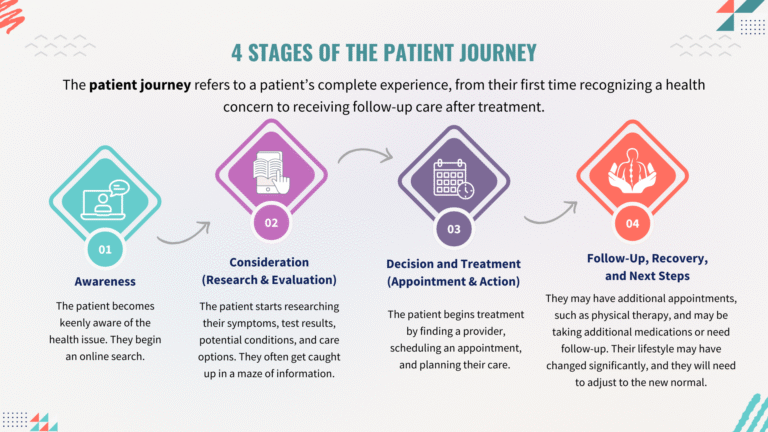- By Kimberly Hennerfeind, RN
As thousands of content are produced every day, it seems impossible to rank on Google. This is where an effective search strategy comes into play. You’ve worked hard to produce healthcare content but the work does not just stop on a publish-and-go process. Learn the right search strategies for your healthcare businesses to reap the benefits of optimized healthcare content.
With access to today’s technology, we have more information than we could imagine. But tasked with searching a particular subject, how do you find that needle in the proverbial haystack?
Knowing what search strategies to use, such as controlled vocabulary, the art of Boolean operators, and even small things like quotation marks, can make a significant difference in finding your subject. This article will give you a roadmap to finding and putting the best information into a research strategy.
What are Some Best Practices I Should Follow When Developing My Search Strategy?
An essential practice when searching is the choice of database you’re using. Ensuring you’re retrieving information from a reputable source and not something like an opinion forum, where the information may be irrelevant, is crucial to the value of the content you seek.
Starting with reliable sources is your first step in conducting your research question. Databases in healthcare are many, but a few examples are PubMed, Embase, and WebMD. Researchers collaborate to source information on these sites by researching healthcare topics and issues. And many have published their dissertations in this process.
After choosing a reliable database, follow these best practices to develop your search strategy:
- Define Clear Research Objectives: Defining your research objectives before diving into your search is essential. Knowing what you’re looking for helps you stay focused and find the information that directly addresses your needs.
- Choose Relevant Keywords: Think about the specific words or phrases that best represent your topic and use them in your search to get more accurate and targeted results.
- Use Advanced Search Techniques: Familiarize yourself with advanced search techniques and operators to refine your search results. These techniques may include using quotation marks for exact phrases, excluding specific terms with the “not” operator, or searching within particular domains.
- Explore Various Search Engines and Databases: Don’t limit yourself to a single search engine or database. Often, other sources with great information can be overlooked. So give them a try! Bloggingwizard.com lists 21 alternative search engines that you can use.
- Evaluate and Select Reliable Sources: When you’re writing to an audience, particularly one you wish to educate in some way, it’s crucial that your sources are experts in their fields. The old, you don’t want a mechanic doing your mother’s brain surgery applies here. So, if you’re researching a blog aimed at a neurology patient audience, using neurologists as sources is helpful.
- Refine and Iterate Your Search: If your initial search does not yield satisfactory results, refine your search strategy by modifying your keywords, using alternative search terms, or exploring different databases. Iterative searching is often necessary to find the most relevant and comprehensive information.
- Keep Track of Your Sources: Maintain a record of the sources you find during your search, including the URLs, article titles, authors, and publication dates. This process will help you organize your research and facilitate proper citations in your blog or other written work.
Benefits of Using SEO in Search Strategies
Searching for a particular topic can be daunting if you don’t have knowledge as to how to conduct it. Learning the search techniques will save you endless hours when narrowing down your results.
Search engine optimization (SEO) is a phrase used by IT and marketing geniuses to describe how best to lead someone to your site. By using keywords and phrases in your content that seekers are more likely to use, you enhance your chances of being ranked higher on a search engine such as Google.
For the researcher, it’s more about using your search engine in the best way possible by knowing how to seek out a particular subject. A search may lead you to the highest level of research or mommy blogs, depending on what you’re looking for. If you want to know how mRNA works in the COVID vaccine, then PubMed is your best bet. However, if getting play slime out of the white carpet is your goal, finding that perfect blog will better suit your needs.
Below are some of the benefits of using SEO:
- When you understand how to use SEO, you will spend more time actually finding your information and less time trying to find it.
- Using the most relevant keywords and phrases will likely bring the highest-rated sites in your subject to the top of your search engine lists, making it less necessary to scroll down long lists of websites.
- Using correct terminology and phrases will bring you to websites that speak to your subject; therefore, you’re more likely to retrieve accurate information.
Common Mistakes to Avoid When Developing a Search Strategy
So, we just talked about what to do, but what don’t we do?
Suppose you focus on something other than what you’re researching. In that case, you can find yourself down so many rabbit holes you’ll end up in Alice’s Wonderland trying to replicate Aunt Mamie’s strawberry jam. Not staying focused is a huge pitfall.

It’s difficult to fake not knowing your topic. Everyone’s nightmare of someone just reading the PowerPoint verbatim while the crowd looks at the handouts is a sure sign of a lack of research. They could have made it that much more interesting if they knew the subject. It’s the same for writing about and searching for your topic. The need to know and understand what you’re researching sends you where? Down those rabbit holes again.
When developing a search strategy, avoiding some common pitfalls is essential. Failing to properly research keywords, not understanding the target audience, and neglecting to take advantage of emerging trends are all mistakes that can lead to ineffective campaigns. Additionally, ignoring the competition and not monitoring the success of your campaigns can hinder the search process.
By taking the time to research and analyze the data, you can create an effective search strategy that yields positive results.
How a Search Strategy Looks in Practice
The University of Leeds explains that your search strategy should account for the following:
- Possible search terms
- Keywords and phrases
- Truncated and wildcard variations of search terms
- Subject headings (where applicable)
When sitting down to search, you must have a clear idea of your search question to determine the best search engine. Developing your strategy includes learning how to search for exact phrases and use truncated and wildcard searches, subject headings in your search, and Boolean logic.
The New York Public Library defines Boolean searching as a method of “symbolic logic developed by George Boole, a 19th-century English mathematician. Boolean searches allow you to combine words and phrases using the words AND, OR, NOT (known as Boolean operators) to limit, broaden, or define your search.”
The three leading Boolean operators work as follows:
- AND: Using AND between words such as infant nutrition AND breastfeeding will narrow search results to only those in both keywords.
- OR: OR will broaden the search to include either keyword. For example, infant nutrition OR breastfeeding will return results containing infant nutrition, breastfeeding, or both.
- NOT: NOT excludes terms from the search; for example, infant nutrition, NOT breastfeeding. There will be no results about breastfeeding for this search.
So, if you want to sit down and do a subject search, take the time to learn how to research so you can learn how to perform some best practices in your quest for information.
References
Burns, S. (2011, February 22). What is Boolean Search?. New York Public Library. https://www.nypl.org/blog/2011/02/22/what-boolean-search
Blogging Wizard. https://bloggingwizard.com/
Embase. https://www.embase.com/landing?status=grey
PubMed. https://pubmed.ncbi.nlm.nih.gov/
University of Leeds. (n.d.). Literature searching explained. https://library.leeds.ac.uk/info/1404/literature_searching/14/literature_searching_explained/4
WebMD. https://www.webmd.com/

About the Author
Kimberly Hennerfeind RN
Kimberly Hennerfeind RN attended McMaster University in Hamilton, Ontario, and George Brown College in Toronto, Ontario. With almost 30 years in the nursing field, Kimberly has worked in several areas of healthcare including neonatal intensive care, pediatric trauma, and hospice case management. Her career has also spanned the legal field as an expert witness and consultant working in forensic psychiatry. She is also an entrepreneur and remains active in the nursing field. Kimberly lives near Nashville, TN with her husband, two Bostons, sons, and twin granddaughters.




